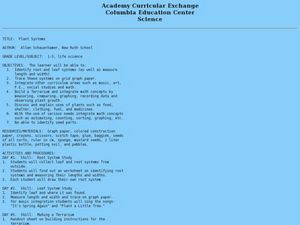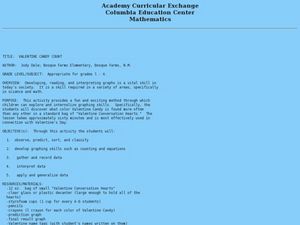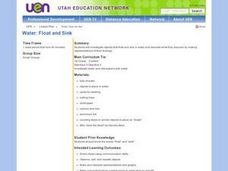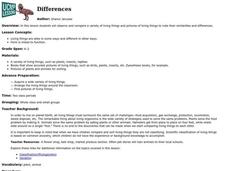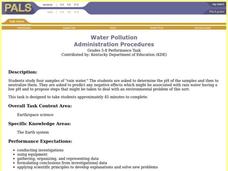Curated OER
PLANT IMAGERY
Students study morphological terminology. One student is blind-folded while the other describes a nearby plant. Once the blindfold is removed, the partner tries to find the plant that was described. They share their experience...
Curated OER
What Do You Know About the Birds Around You?
Students compare and contrast various species of birds. After participating in a brief discussion of the characteristics of birds, they view birds in their natural habitat and in pictures with a focus on the similarities and differences...
Curated OER
It's Alive
First graders critically analyze living and nonliving objects, then develop a list of characteristics to classify objects on a science walk. They make a book to close out the lesson.
Curated OER
Renewable vs. Non-Renewable Resources
Fifth graders, after brainstorming why conservation of resources is important, distinguish between renewable and non-renewable resources. They make a list of different types of natural resources on the board and then sort them into two...
Curated OER
Plant Systems
Learners examine plant systems. In this life science lesson, students explore leaf and root systems on paper in a terrarium that they design and construct.
Curated OER
How Does Flowing Water Shape a Planet's Surface?
Students investigate how flowing water influence landforms. For this earth science lesson, students observe water behavior as it flows from the stream table at various inclinations. They discuss whether water shaped Mars landforms or not.
Alabama Learning Exchange
Seeds: How They Grow
Students observe the growing stages of plants. In this plant growth lesson plan, students collect, germinate, and plant seeds to chart the growth process of plants.
Curated OER
What Parts Are There to a Plant?
Students explore botany by completing plant science worksheets. In this plant anatomy lesson, students examine real vegetables in class using magnifying glasses. Students identify the plants anatomy and complete worksheets discussing...
Curated OER
Valentine Candy Count
Students investigate what color Valentine Candy is found more often than any other in a standard bag of "Valentine Conversation Hearts." They sort, classify and graph their findings.
Curated OER
Water: Float and Sink
First graders work in small groups to observe the tendency to float or sink for a variety of objects in water. They sort the objects and discuss their observations. They use aluminum foil to construct a boat and test it for weight capacity.
Curated OER
Look at Those Leaves!
Students observe leaves. In this math and science cross-curriculum leaf lesson, students take a nature walk and collect leaves. Attributes are assigned and leaves are sorted in various ways. Students use non-standard or standard units of...
Curated OER
Critter Museum
Students act as directors of a new science museum where they have decided to set up a display of animals without backbones that are found in the area. To organize their display, they need to sort and classify a collection of animals and...
Curated OER
Pollination Partners
In this science worksheet, students look for the causes and effects of pollination through doing some arts and crafts projects that includes a collage.
Curated OER
A Planet Full of Animals
Students study animals and practice classifying them through observation activities. In this animal classification lesson, students complete a KWL chart about animals. Students then sort pictures of animals into chart categories based on...
Curated OER
More Lizard Snacks
Students listen to Chapter I, Chapter II, Chapter III, and Chapter IV of "The Forgetful Pony". They observe different stages of development of mealworms. The student sequences pictures to show the life cycle and draws the developmental...
Curated OER
Rubber Band
Eighth graders investigate what would happen to the length of a rubber band as more and more rings were hung on it. They base their explanation on what they observed, and as they develop cognitive skills, they should be able to...
Curated OER
Differences
Students observe and compare a variety of living things and pictures of living things to note their similarities and differences.
Curated OER
Whose Parts Do I Have? (Wings and Things)
Learners identify an animal and a body part and then matches a body part to a specific animal. This will assess their ability to sort organisms and objects into groups according to their parts and describe how the groups are formed and...
Curated OER
Look At Those Leaves!
Students explore botany by researching plants in class. In this tree identification lesson, students examine a group of leaves and list the different characteristics before guessing what types of trees they came from. Students read about...
Curated OER
Water Pollution
Young scholars study four samples of "rain water". They asked to determine the pH of the samples and then to neutralize them. Students are asked to predict any negative effects which might be associated with water having a low pH and...
Curated OER
Clues to Copying the Code
In this DNA worksheet, students access a website to determine the information that was used to understand DNA replication. Students compare the difference between observations and opinions. This worksheet has 7 short answer questions and...
Curated OER
Rocks Lesson Plan
Students become familiar with the characteristics of rocks and use them to sort. In this rocks lesson, students view a video, then try to identify various rock samples.
Curated OER
Classification 1: Classification Scheme
Students examine how many kinds of living things can be sorted into groups in many ways using various features to decide which things belong to which group and that classification schemes vary with purpose.
Curated OER
Classification 2: A Touch of Class
Students examine how many kinds of living things (e.g. plants and animals) can be sorted into groups in many ways using various features to decide which things belong to which group and that classification schemes vary with purpose.




